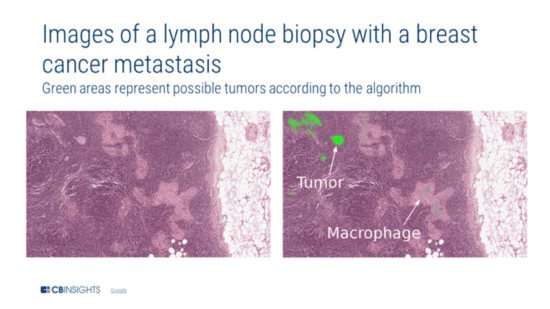Prognosis establishes the seriousness and the stage of the tumor, which reflects the survival rate of the patient. An AI model was developed using deep learning to predict the survival rate of patients who’d undergone a gastrectomy. The deep tool was better at making predictions when compared to the predictions made based on the regular Cox regression. Turkki et al. quantified tumor-infiltrating immune cells in slide analyses of breast cancer samples using an antibody supervised deep learning approach.
There are a number of companies that are pursuing the potential applications of AI in oncology. As well as helping with image interpretation such as in mammography and body scanning to find lesions, there’s the analysis of genomics and mutations and the process of matching those with the best treatment combinations and clinical trials. Tempus uses clinical and biological data to create a digital twin and uses nearest neighbor analysis to find the best course of management.
Arterys Inc, a medical imaging software provider, has been given 510(k) clearance for Artyrys Oncology AI suite, which is a web-based tool that helps clinicians to analyze MRIs and CTs to look for liver and lung cancer. The tool uses deep learning algorithms to expedite the interpretation of these images.
Meanwhile, startups like Freenome are using AI to spot patterns in cell-free biomarkers in the blood that could be associated with cancer. In 2017, Freenome released research on tumor identification in which algorithms were trained on existing images of breast cancer that had metastasized to adjacent lymph nodes. The algorithms could detect tumors with 92% accuracy, allowing for some false positives (such as macrophages that might look like tumors). It’s Freenome’s hope that it will be able to detect cancer earlier by picking up on the trace amounts of DNA that tumors shed into the bloodstream, thus circulating tumor DNA.
Google has made significant investments in pursuing AI applications in healthcare, including in oncology. In 2017, it partnered with the UK’s National Health Service and the Cancer Research UK Centre at Imperial College London to continue working towards the early detection of breast cancer. At the same time, DeepMind is working on other cancers, including head and neck cancer. DeepMind is focused more on treatment design, with the goal of using AI to speed up the mapping process to determine where to apply radiotherapy. The current mapping process takes approximately four hours—DeepMind believes it can shorten it to one.






